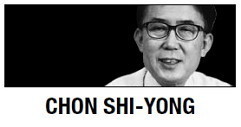 Former President Lee Myung-bak said last week that he had given up on a plan to establish a foundation commemorating his presidency because authorities kept looking into the possible wrongdoings of his associates.
Former President Lee Myung-bak said last week that he had given up on a plan to establish a foundation commemorating his presidency because authorities kept looking into the possible wrongdoings of his associates.
Lee did not directly mention the state prosecution, but Lee’s comment came shortly after prosecutors admitted that it had traced the financial accounts of some of Lee’s former aides in connection with a corruption probe.
It is not the first time that people close to Lee have been targeted over suspected corruption and abuse of power. Recently, prosecutors probed Lee Sang-deuk — the former president’s elder brother — and other former senior officials of the Lee administration in connection with a corruption investigation into steel giant POSCO.
There is nothing wrong if the authorities are exerting their legitimate rights and duties to exercise justice against the bad guys.
There is something wrong, however, if anything other than pursuit of justice is behind the investigations into cases involving the former president or his relatives and associates.
Bashing predecessors
It is an open secret that presidential politics often works behind the investigation of former presidents — be they about corruption or policy failures.
Of course, Korea is not the only country in which the incumbent president and his or her predecessor have a tense relationship. But sometimes it goes to extremes, as seen by the tragic death of former president Roh Moo-hyun, who died by suicide amid a corruption probe during the Lee administration.
A triad of factors, in my view, causes this objectionable tradition of a government in power bashing previous administrations. Firstly, Korean presidents — and their relatives and associates — commit so many misdeeds. In other words, presidents themselves breed the base for their own punishment after retirement.
Presidents Chun Doo-hwan and Roh Tae-woo took power in a coup, and after moving into the Blue House, both amassed huge sums in slush funds by extorting money from conglomerates.
President Kim Young-sam, in the name of “righting the wrongs of history and corruption busting,” punished his immediate predecessors for treason and graft.
In turn, Kim had to see his own son dragged to jail for graft and interfering with state affairs. All of his successors — Kim Dae-jung, Roh Moo-hyun and Lee — were troubled by similar cases, with their sons, brothers and close associates receiving criminal punishment. The tradition of bashing previous administrations thrives on this never-ending chain of misdeeds committed by people close to the president.
Political motives
The second factor is that the incumbent president loves the sweetness of punishing what the public sees as crooked former power elite. Busting the bad guys of the past usually draws cheers, which can be a great boon for the president, especially when the administration is not in good shape.
It is out of such political calculation that Roh Tae-woo sent his mentor and military academy classmate Chun to exile in a remote temple.
Roh Moo-hyun appointed special prosecutor to investigate his fellow liberal predecessor Kim Dae-jung’s aides over Kim’s cash payment to Pyongyang, which facilitated his historic summit with North Korea’s then-leader Kim Jong-il.
The third factor — related to the second — that enables the extension of the bashing tradition is the lack of political independence of powerful agencies like the state prosecution, intelligence agency, state audit agency and tax service.
Since the authoritarian governments of Park Chung-hee and Chun, these powerful agencies have been used as a governing tool by the presidents in power.
Both the presidents and the agencies got used to such a relationship so much so that even Kim Young-sam and Kim Dae-jung, who spent much of their political career as part of the opposition and suffered oppression at the hands of dictators like Park and Chun — failed to do away with these practices.
Both are to blame for the undemocratic relationship; the president for not guaranteeing the political independence of the agencies; and the agencies for not trying to rid themselves of the practice of pandering to the president in power.
All in all, severing the vicious circle of the president in power bashing previous administrations is a tall order. I just wonder how the tradition will work on Park and her successor, who is to be elected in two short years.
By Chon Shi-yong
Chon Shi-yong is the chief editorial writer of The Korea Herald. He can be contacted at sychon@heraldcorp.com. — Ed.

